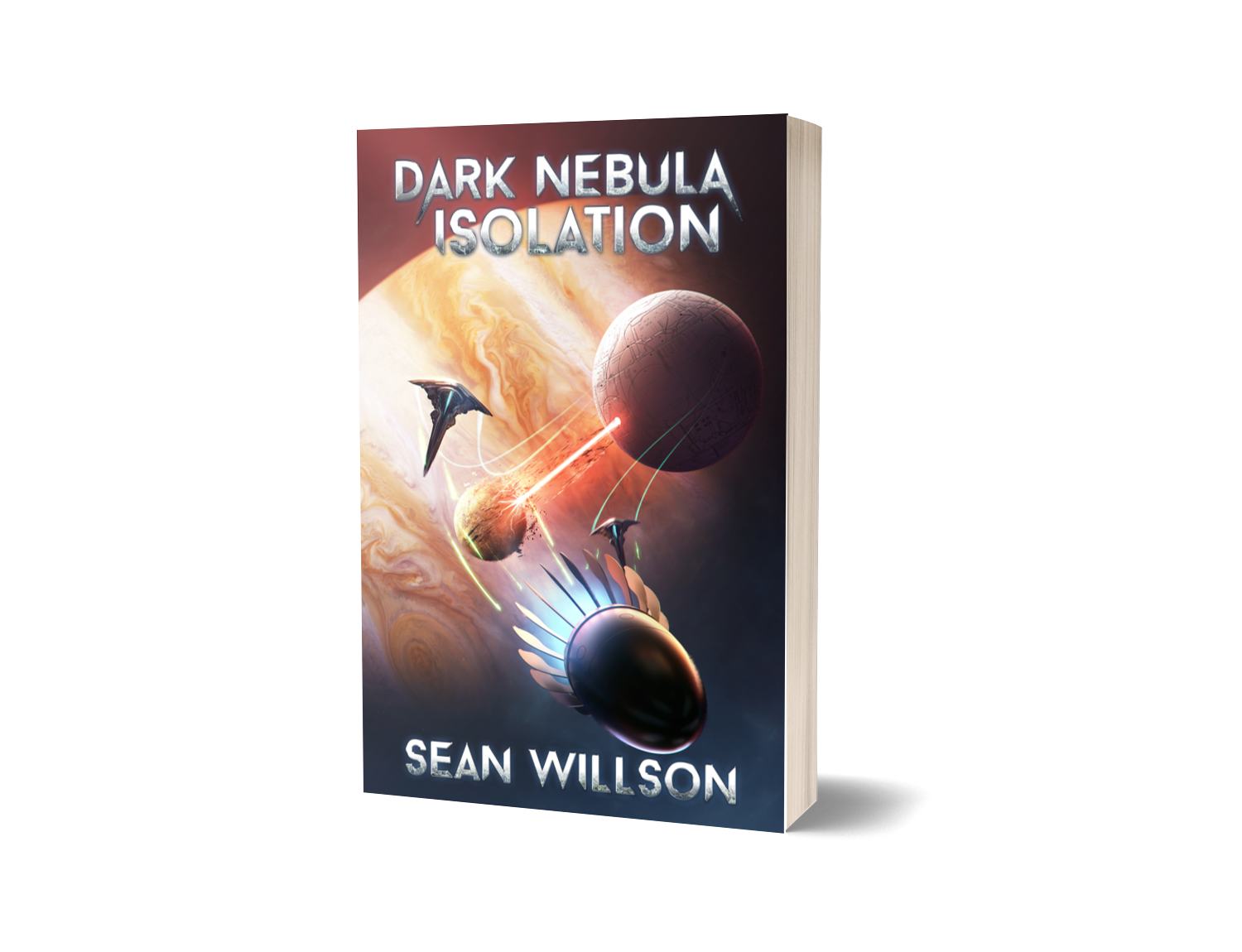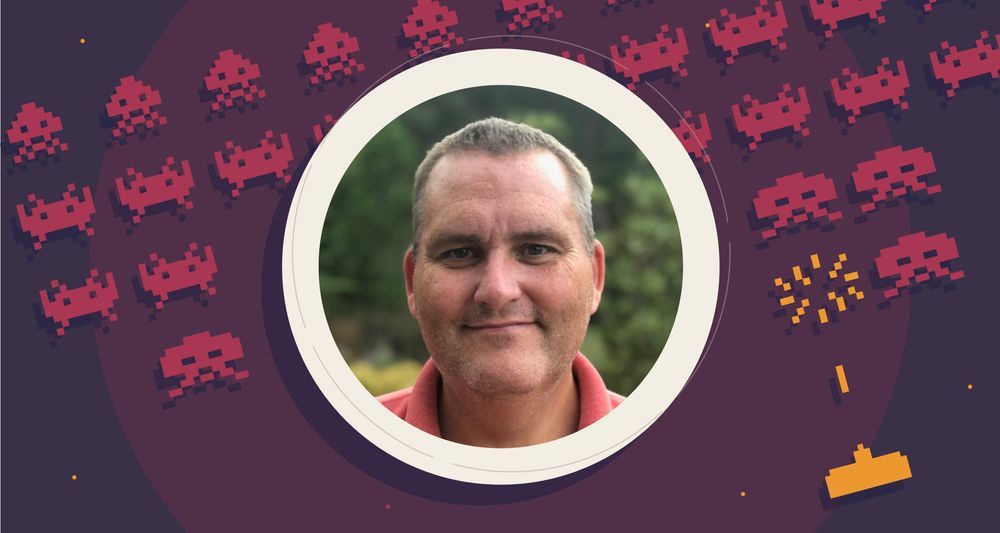Although Sean Willson struggled with English classes throughout his high school and college career, he has now published an entire science fiction book series. Here’s how he finds the time to write without cutting back on his family life, why he decided to self-publish his books, and how being an author helps him with his job in the software industry.
Please tell us a little about yourself and your professional background.
I’m a full-time Software Engineering Manager in my day job. Like many of you, computers are something I’ve used since I was a teenager. That was when I started programming. I already spent hours in the library either reading sci-fi or messing around with computers, so turning it into a career made sense.
During college, my passion for computers grew. Using them to solve mundane human problems in intuitive ways was something that has driven me throughout my career. After college, I practiced programming for a while before I eventually took that passion into management. Today, I enable teams of engineers to change the world via those same computational devices. While their form has changed over the years, their impact has only grown.
Having a full-time job and a family, how do you manage to make time for writing?
That’s a great question, and one I’ve been asked several times. I have three children. They’re nine, eleven, and thirteen years old, respectively. As you can imagine, there’s a lot going on in our house at any one moment. Scouting, marching band, swim team, school, etc. We rarely have a day to just sit back and do nothing. Before I had kids, I vowed to always be a part of their life. I never wanted to miss an important moment in their life because I was absent.
That meant finding and managing time was the name of the game if I wanted to write. For me, I had to take a hard look at my life and ask myself if each chunk of time I spent was worth it. Did it quench my thirst for self-improvement? Did it make me healthy? Or was I more relaxed afterward than before?

After I was done answering those questions, it was obvious that I needed to cut nearly all television and media. It’s astonishing how much time people spend watching other people live their lives. Now, don’t get me wrong, I’m not saying people shouldn’t relax. That’s just silly. I’m merely saying that the sheer number of hours spent doing it over all other things is stunning.
Cutting that time created tens of hours a week to sprinkle about. An hour in the morning or thirty minutes over lunch. Maybe a few hours at night after dinner, homework, and some goofing off time with the kids. The time was there, and it was ripe to use for writing.
The results speak for themselves: I released Dark Nebula: Isolation in December 2020 and have released three more books in that series since. I’m currently writing book five in Dark Nebula, and I’ve finished the first book in a new sci-fi techno-thriller series I’ll be releasing in mid-2022.
Do you feel that writing has an influence on you in your everyday professional life?
I began writing in earnest about seven years ago. Before that, I lacked the confidence in my ability to write fiction, but funny enough enjoyed writing user documentation. I used to hate poorly written guides and developer docs. More often than not, I’d rewrite the content my teams had created after I read them.
Once I broke the seal to writing fiction, it’s made a world of difference in my day job. My constant drive for self-improvement has helped me refine my craft and optimize my writing process. Throughout the years of heads down iteration, writing sprints, and books, I find that I now write better in all of my day-to-day interactions. Be it email, newsletters, Slack, or whatever, that focus on clear and concise wording when conveying an idea in fiction translates perfectly to engineering.
Where do you get the inspiration for your stories?
Ever since I was young, I’ve read science fiction. It started as a passion for space and the unknown. From robots, to aliens, to exploring new and mysterious worlds, the adventures authors packed into books was mind-blowing. What I later realized was that these books weren’t just entertainment, they were my means to escape from my own challenging life. I won’t get into it here, but that escapism was important and allowed me to become the person I am today. How this has inspired my stories is hard to describe. But put simply, my stories aim to unlock that same escapist ability. I want my reader to be able to check out of whatever they have going on, and teleport themselves into an alternative universe.
I’ve always enjoyed taking the discoveries and technical advances we have today and imagining the fantastical things we could do with them in the future, both positive and negative.
Beyond the story, I get inspiration from my lifelong love of technology. I’ve always enjoyed taking the discoveries and technical advances we have today and imagining the fantastical things we could do with them in the future, both positive and negative. Exploring those futuristic landscapes and the fine lines of a technologies impact doesn’t just make a compelling story. It helps society digest new ideas and hopefully make better decisions in our future.
You self-publish your books. Do you have any advice for other writers who are also considering this method of publishing?
This one can be contentious, as self-publishing isn’t for everyone. I was one of those people who didn’t want to spend years and years hunting for an agent and then follow that for years hunting for a publisher, only to finally get scraps of revenue from my stories. I wasn’t in a rush to publish, either. I’ve never been someone who cuts corners. To me, self-publishing is about me owning the creative content and being able to sell it to whomever I want, in whatever form I want. Many publishers nowadays own your work in perpetuity and in all applications once you sign that contract. To me, that just feels wrong.

I don’t mind learning the book business. Sure, I’d rather write more, but if I was asked to choose between a publisher offering 2% of profits with a $10k advance or me taking home a lion’s share of all sales doing it myself, I’d choose to self-publish every time. I’ll be selling these books for decades, and after I pass, I can give them to my children to do what they want. Just think about that. It’s about the long game with any type of publishing, not necessarily the here and now.
What do you like best about Ulysses? Do you have a favorite feature?
For me, the thing I love most about Ulysses is that it’s available on all my platforms. On my iPhone, my iPad, and my Mac laptop. No matter where I am or what I’m doing, if inspiration hits, it’s there for me.
In terms of my favorite feature, I’d have to go with the unsung hero of backups. Yes, I love the minimal UI, goal setting, integrated grammar tools, and other features, but backup is the quiet superhero of your workflow. You don’t need it until you do.
If you’re like me, you’re a set it and forget it type person. In Ulysses, I can rest comfortably knowing that my creative files are safe. I regularly back these files up to my iCloud Drive as well as external disk. You can never be too safe, and let’s be honest, these are your creative life works. Losing them would be devastating.
What other tools and resources help you as a writer?
The first tool I started with as a self-published author was ProWritingAid. It helped me to strengthen my writing by identifying all the areas that needed attention and, most importantly, making suggestions. The second tool I added to my arsenal was Vellum. If you can’t create high-quality print and e-books, no one will buy your stories. Vellum is far and above the leader in this space.
Outside those, I use the entire Affinity line of products, including Publisher, Photo, and Designer, to help with my book covers and creatives on my website. I also have several creative writing book resources I use, like The Emotion Thesaurus, Wide for the Win, and the suite of training classes from the Self Publishing Formula. They’ve helped me get my manuscripts into the online retailers, research keywords, create newsletters, and manage my writing like a business. In the end, we all want to get our work in as many users hands as possible. Treating that part like the business it is will help you turn that dream into a reality.
What are your learnings in regard to writing ever since you started it?
Have faith in yourself. You’re doing better than you realize.
Every time you crack open Ulysses and write those fifty or two thousand words, that’s more words than you had an hour ago, or yesterday. They don’t need to be perfect, they simply have to pour an idea out of your head. It might not even be a good one, and that’s fine. There’s a good one in there, and the more you write, the more likely it’ll pour out as well. Once you have it, you can revise and refine those words until they feel right. That’s part of the game. Just don’t convince yourself that you’re not good enough to write. You don’t need to have a bestseller or an agent to be an author. You simply have to write.
Have faith in yourself. You’re doing better than you realize.
Trust me, as someone who was constantly challenged by English classes his entire undergrad and collegiate career, I can attest that it’s not as hard as those teachers made it out to be. I had some truly amazing Science and Math teachers, and for that, I’m forever grateful. They made me into the engineer I am today. I just never had that English teacher who clicked with me, and that’s fine. That doesn’t, however, mean you can’t write. It just means you need to work that much harder to refine your craft and find your hidden stories. They’re in there, being pushed down with all the social media, streaming popular culture, and television.
You might ask how you start. It’s simple. Shut them off. All of them (except this article, of course). Go ahead and do it. I’ll wait here.
Now that you’re done, go open Ulysses and start writing. It’s honestly that easy.
Would you like to find out more about Sean’s work? Then visit his website or explore his books.
